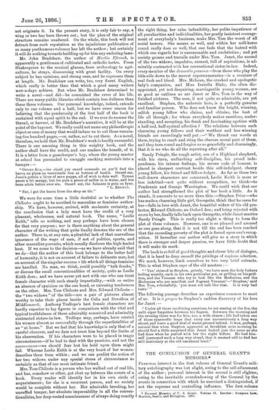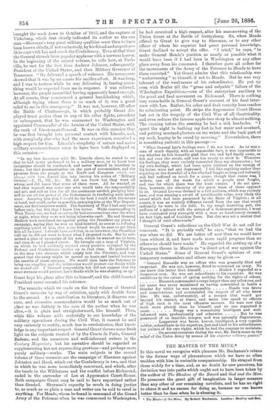THE CONCLUSION OF GENERAL GRANT'S MEMOIRS.* PERSONAL interest in the
first volume of General Grant's mili- tary autobiography was but slight, owing to the self-effacement of the author ; personal interest in the second is still slighter, owing to the inevitable overshadowing of the General by the events in connection with which he exercised a distinguished, if not the supreme and controlling influence. The first volume
• Personal Memoirs of U. S. Grant. Volume II. London : Sampson Law, Marston, Searle, and Rivington. ISM
brought the work down to October of 1863, and the capture of Vicksburg, which first clearly indicated its author as the one man—Sherman's very great military qualities seem then to have been known chiefly, if not exclusively, by his friend and superior— fit to cope with Lee and crush the Confederacy. Even at that time the General shrunk from popular applause with a nervous horror. In the beginning of the second volume, he tells how, at Nash- ville, he met for the first time Andrew Johnson, subsequently President of the United States, and then Military Governor of Tennessee. "He delivered a speech of welcome. His composure showed that it was by no means his maiden effort. It was long, and I was in torture while he was delivering it, fearing some- thing would be expected from me in response. I was relieved, however, the people assembled having apparently heard enough. At all events, they commenced a general handshaking which, although trying where there is so much of it, was a great relief to me in this emergency." It was not, however, till after the Battle of Chattanooga, in which probably Grant dis- played truer genius than in any of his other fights, precedent or subsequent, that he was summoned to Washington and appointed Commander of the Armies of the United States, with the rank of Lieutenant-General. It was on this occasion that he was first brought into personal contact with Lincoln, and, with everybody else who had the same experience, conceived a high respect for him. Lincoln's simplicity of nature and naïve military amateurishness seem to have been both displayed on this occasion :—
"In my first interview with Mr. Lincoln alone, he stated to me that be had never professed to be a military man, or to know how campaigns should be conducted, and never wanted to interfere in them ; bat that procrastination on the part of commanders, and the pressure from the people at the North and Congress, which was always with him, forced him into issuing his series of Military Orders,'—I., II., III , Sse. He did not know but they were all wrong, and did know that some of them were. All he wanted, or had ever wanted, was some one who would take the responsibility and act, and call on him for all the assistance needed, pledging him- self to use all the power of the Government in rendering such assist- ance. Assuring him that I would do the best I could with the means at hand, and avoid, as far as possible, annoying him or the War Depart- ment, our first interview ended. The Secretary of War I had met once before only, but felt that I knew him better. While commanding in West Tenne,see, we had occasionally had conversations over the wires at night, when they were not being otherwise used. He and General Halleck both cautioned me against giving the President my plans of campaign, saying that he was so kind-hearted, so averse to refusing anything asked of him, that some friend would be sure to get from him all he knew. I should have said that, in an interview, the President told me he did not want to know what I proposed to do. But he sub- mitted a plan of campaign of his own, which he wanted me to hear, and then do as I pleased about. He brought out a map of Virginia, on which he had evidently marked every position occupied by the Federal and Confederate armies up to that time. He pointed out on the map two streams which empty into the Potomac, and sug- gested that the army might be moved on boats and landed between the mouths of these streams. We would then have the Potomac to bring our supplies, and the tributaries would protect our flanks while we moved out. I listened respectfully, but did not suggest that the same streams would protect Lee's flanks while he was shutting us up."
Grant kept his plans after this to himself, and the child-hearted President never resented his reticence.
The remarks which we made on the first volume of General Grant's memoirs by way of criticism, apply with double force to the second. As a contribution to literature, it disarms cen- sure, and excessive commendation would be as much out of place as was flattery in the case of the author when he was alive,—it is plain and straightforward, like himself. Then, while this volume adds materially to our knowledge of the military operations during the Civil War, it cannot be said very seriously to rectify, much less to revolutionise, that know- ledge in any important respect. General Grant throws some fresh light on the subjects treated of by the Comte de Paris, General Badean, and the numerous and well-informed writers in the Century Magazine; but his narrative should be regarded as supplementing but not superseding previous—and perhaps more purely military—works. The main subjects in the second volume of these memoirs are the campaign of Sherman against Johnston and Hood, which cut the Confederacy in two, and that in which he was more immediately concerned, and which, after the tussle in the Wilderness and the conflict before Richmond, ended in the surrender of Lee at Appomatox Court-House. Both campaigns Grant may be said to have supervised rather than directed. Sherman's capacity he revels in doing justice to, as much as so plain a man and writer can be said to revel in anything. For Meade, whom he found in command of the Grand Army of the Potomac when he was summoned to Washington, he had conceived a high respect, after his manoeuvring of the Union forces at the Battle of Gettysburg. So, when Meade offered to Grant to give way to Sherman, or to any other officer of whom his superior had great personal knowledge, Grant declined to accept the offer. "I tried," he says, "to make General Meade's position as nearly as possible what it would have been if I had been in Washington or any other place away from his command. I therefore gave all orders for the movements of the Army of the Potomac to Meade to have them executed." Yet Grant admits that this relationship was " embarrassing " to himself, if not to Meade. But he was very tolerant of the weaknesses of his subordinates. He put up even with Butler till the "gross and culpable" failure of the Wilmington Expedition,—one of the enterprises ancillary to the great and final movement on Richmond. There is nothing very remarkable in General Grant's account of his final inter- view with Lee. Rather, his sober and drab veracity here reaches its culminating point. He strips the Appomatox Court-House last act in the tragedy of the Civil War of all theatricality, and even reduces the famous apple-tree story to almost nothing. The evening before the meeting he had a sick headache. "I spent the night in bathing my feet in hot water and mustard, and putting mustard-plasters on my wrists and the back part of my neck, hoping to be cured by morning." Nevertheless, there is something pathetic in this passage:—
"What General Lee's feelings were I do not kuow. As he was a man of much dignity, with an impassable face, it was impossible to say whether he felt inwardly glad that the end had finally come, or felt sad over the result, and was too manly to show it. Whatever his feelings, they were entirely concealed from my observation ; but my own feelings, which had been quite jubilant on the receipt of his letter, were sad and depressed. I felt like anything rather than rejoicing at the downfall of a foe who had fought so long and valiantly and had suffered so much for a cause, though that cause was, I believe, one of the worst for which a people ever fought, and one for which there was the least excuse. I do not ques- tion, however, the sincerity of the great mass of those opposed to us. General Lee was dressed in a full uniform, which was entirely new, and was wearing a sword of considerable value, very likely the sword which had been presented by the State of Virginia ; at all events, it was an entirely different sword from the one that would ordinarily be worn in the field. In my rough travelling suit, the uniform of a private with the straps of a lieutenant-general, I must have contrasted very strangely with a man so handsomely dressed, six feet high, and of faultless form. But this was not a matter that I thought of until afterwards."
General Grant's reflections on the Civil War do not call for comment. "It is probably well," he says, "that we had the war when we did. We are better off now than we would have been without it, and have made more rapid progress than we otherwise should have made." He regarded the Betting-up of a European throne in Mexico as "a direct act of war against the United States." Some of General Grant's opinions of con- temporary commanders and others may be given :—
'General Burnside was an officer who was generally liked and respected. He was not, however, fitted to command an army. No
one knew this better than himself Hooker I regarded as a dangerous man. He was not subordinate to his superiors. He was ambitions to the extent of caring nothing for the rights of others.
Hancock commanded a corps longer than any other one, and his name was never mentioned as having committed in battle a blunder for which he was responsible Meade was brave and conscientious, and commanded the respect cf all who knew him. He was, unfortunately, of a temper that would get beyond his control, at times, and make him speak to officers of high rank in the most offensive manner. No man saw this fault more plainly than he himself, and no one regretted it
more Bragg was a remarkably intelligent and well- informed man, professionally and otherwise Bat he was possessed of an irascible temper, and was naturally disputatious. Longstreet was brave, honest, intelligent, a very capable soldier, subordinate to his superiors, just and kind to his subordinates, but jealous of his own rights, which he had the courage to maintain.
On several occasions during the war, Mr. Davis came to the relief of the Union Army by means of his superior military genius."



































 Previous page
Previous page